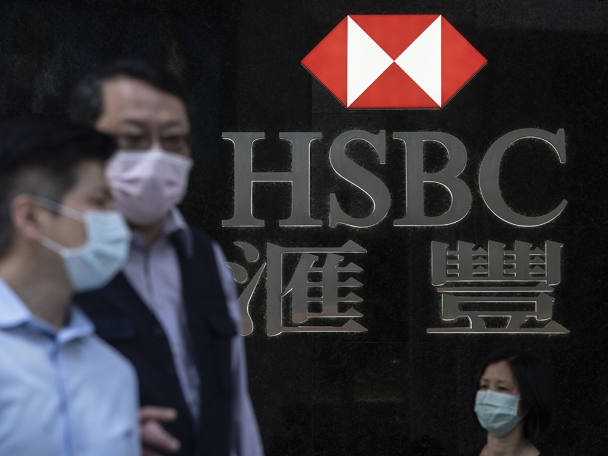When the Hongkong and Shanghai Bank was founded in 1865, a financial bridge for the growing trade between Asia and Europe was built. Since then, the bank we now know as HSBC (HSBA) has retained its role as a global lender, in large part thanks to the special status afforded to the former British colony in which it was incorporated.
This vaunted position is under sudden strain. On 28 May, China approved sweeping new national security legislation banning “subversion, secession and foreign interference” in Hong Kong. The move has been widely interpreted as a step to curtail freedoms in the administrative region, with enormous ramifications for both business and civil society. Even before Beijing signed the legislation, US Secretary of State Mike Pompeo warned the financial centre could no longer be considered autonomous from China.
It increasingly appears HSBC, and to a lesser extent FTSE 100 peers Prudential (PRU) and Standard Chartered (STAN), are caught in an impossible and rather helpless position.
Already, the bank has been called out for failing to publicly support the measures. According to a Bloomberg report, former Hong Kong chief executive Leung Chun-ying last week took to Facebook to warn that “HSBC’s China business can be replaced by banks from China or other countries overnight”. Mr Chun-ying currently serves as a senior member of the CPPCC, a top Chinese political advisory body.
Given its history, HSBC is intimately familiar with the geopolitical balancing act between China and the West. Recently, its “apolitical stance” towards Hong Kong’s machinations was put to the test during the civil unrest sparked by a controversial extradition bill last year. At the time, the group took out a series of full-page advertisements in local newspapers to call for a peaceful resolution to the protests. “Hong Kong has thrived as a result of its stability and resilience,” ran the message. “Maintaining its rule of law is essential to Hong Kong’s unique status as an international financial centre.”
Now, amid the threat to that other pillar of Hong Kong rule – the principle of “one country, two systems” enshrined in the declaration preceding British handover in 1997 – HSBC finds itself stuck between increasingly partisan political interests. For investors, this means a direct threat to the shares’ historically low risk premium.
Asian century
Unfortunately, all of this comes as HSBC doubles down on its Asian footprint, as big as it already is. Indeed, to one bank analyst, “the independence of the region to HSBC’s growth prospects is a moot point”, given the historically high correlation between Hong Kong and Singaporean GDP to China’s growth, and the fact that around 60 per cent of the lender’s profits come from the three countries.
But the strategic drive has been explicit, too. When freshly appointed chief executive Noel Quinn announced his restructuring goals in February, he outlined a plan to reduce risk-weighted assets in underperforming divisions in Europe, the UK and the US, and reinvest them in “high-performing franchises”. In HSBC executive speak, that is a synonym for Asia, as the chart below shows.
Source: HSBC
The focal point for much of this growth may be China, although Hong Kong remains by far the most profitable part of HSBC’s business. In 2019, a year marked by economic contraction in the city state, solid loan growth was mirrored by a 5 per cent uptick in adjusted pre-tax profits to $12.1bn, on revenues of $19.4bn. Ben Toms, a European bank analyst at RBC, estimates that Hong Kong has been responsible for “all of the bank’s profit growth over the last 15 years”.
Indeed, the city state’s return on equity has routinely put UK and US profitability in the shade. This is unlikely to have escaped the attention of HSBC’s Hong Kong-based retail investors, many of whom rely on the lender’s dividend for income, and were vocal in their opposition to the bank’s decision – under considerable pressure from the Bank of England – to cancel its 2019 final payout.
Split focus
The apparent acquiescence to the UK regulator was not without its critics high up in the bank, too. Quoting unnamed sources, a Financial Times report said the dividend episode had prompted some directors and executives to call for another review of the group’s legal base, despite a unanimous board decision in 2015 to keep the global headquarters in the City.
That report was later denied by HSBC, though the prospect of a switch to Hong Kong now looks decidedly less likely.
“Presumably, one of the reasons the [2015] review ended up concluding it would be better to stay in the UK was a concern that in a future state, the Chinese would be able to remove the separate status that Hong Kong has,” says Derek Leatherdale, who used to work in the bank’s government affairs division and set up HSBC’s internal geopolitical risk team. “If that’s correct, events now would therefore be a vindication of the assessment made at the time. But in explaining the rationale, any large firm has to be extremely careful what it says publicly about geopolitical issues”
Executives now face an arguably tougher bind over the bank’s public position on a political matter, and how this message comes across to Beijing and Washington. Here, the group’s apparently prodigious lobbying capacity is likely to be limited. And while channels exist – deputy chairman and Asia chief executive Peter Wong is listed on HSBC’s website as a senior adviser to the Chinese Communist Party – rising tensions between the US and China pose a direct challenge to the globalised business paradigm which defines the bank’s scale and reach.
Should this start to manifest itself in US sanctions, this could add an extra web of complexity for HSBC’s Asia push, even if concern around Hong Kong’s role as a conduit to dollar-based capital markets looks overdone.









